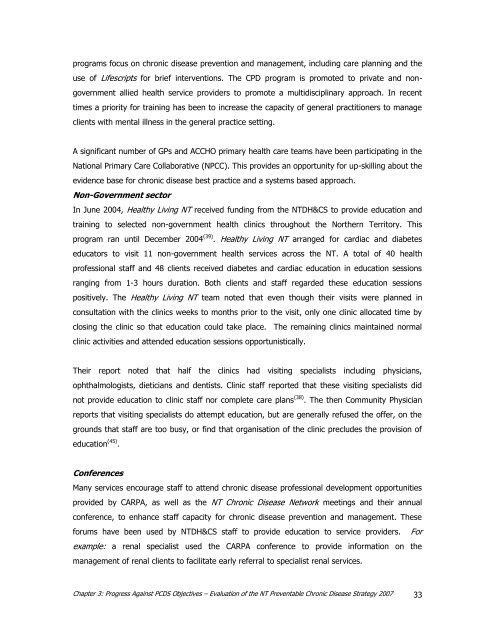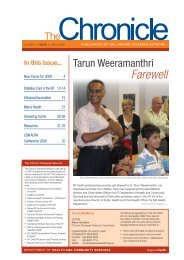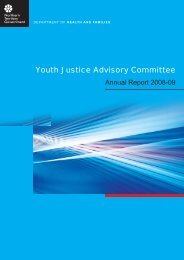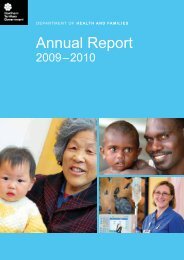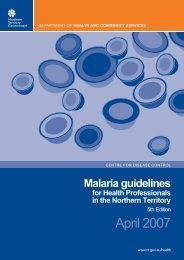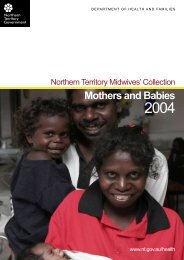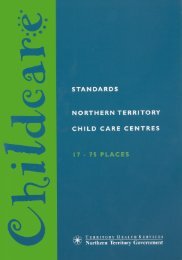PCD Strategy Evaluation 2007.pdf - NT Health Digital Library ...
PCD Strategy Evaluation 2007.pdf - NT Health Digital Library ...
PCD Strategy Evaluation 2007.pdf - NT Health Digital Library ...
Create successful ePaper yourself
Turn your PDF publications into a flip-book with our unique Google optimized e-Paper software.
programs focus on chronic disease prevention and management, including care planning and theuse of Lifescripts for brief interventions. The CPD program is promoted to private and nongovernmentallied health service providers to promote a multidisciplinary approach. In recenttimes a priority for training has been to increase the capacity of general practitioners to manageclients with mental illness in the general practice setting.A significant number of GPs and ACCHO primary health care teams have been participating in theNational Primary Care Collaborative (NPCC). This provides an opportunity for up-skilling about theevidence base for chronic disease best practice and a systems based approach.Non-Government sectorIn June 2004, <strong>Health</strong>y Living <strong>NT</strong> received funding from the <strong>NT</strong>DH&CS to provide education andtraining to selected non-government health clinics throughout the Northern Territory. Thisprogram ran until December 2004 (39) . <strong>Health</strong>y Living <strong>NT</strong> arranged for cardiac and diabeteseducators to visit 11 non-government health services across the <strong>NT</strong>. A total of 40 healthprofessional staff and 48 clients received diabetes and cardiac education in education sessionsranging from 1-3 hours duration. Both clients and staff regarded these education sessionspositively. The <strong>Health</strong>y Living <strong>NT</strong> team noted that even though their visits were planned inconsultation with the clinics weeks to months prior to the visit, only one clinic allocated time byclosing the clinic so that education could take place. The remaining clinics maintained normalclinic activities and attended education sessions opportunistically.Their report noted that half the clinics had visiting specialists including physicians,ophthalmologists, dieticians and dentists. Clinic staff reported that these visiting specialists didnot provide education to clinic staff nor complete care plans (38) . The then Community Physicianreports that visiting specialists do attempt education, but are generally refused the offer, on thegrounds that staff are too busy, or find that organisation of the clinic precludes the provision ofeducation (45) .ConferencesMany services encourage staff to attend chronic disease professional development opportunitiesprovided by CARPA, as well as the <strong>NT</strong> Chronic Disease Network meetings and their annualconference, to enhance staff capacity for chronic disease prevention and management. Theseforums have been used by <strong>NT</strong>DH&CS staff to provide education to service providers. Forexample: a renal specialist used the CARPA conference to provide information on themanagement of renal clients to facilitate early referral to specialist renal services.Chapter 3: Progress Against <strong>PCD</strong>S Objectives – <strong>Evaluation</strong> of the <strong>NT</strong> Preventable Chronic Disease <strong>Strategy</strong> 2007 33


